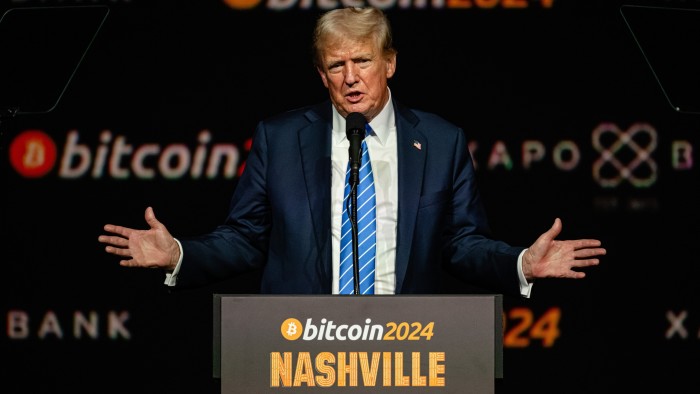Unlock the White House Watch newsletter for free
Your guide to what the 2024 US elections mean for Washington and the world
Donald Trump’s embrace of cryptocurrencies risks undermining new European rules on digital assets as companies neglect the continent in favor of a friendlier US market, industry executives have warned.
Companies such as Binance, the world’s largest cryptocurrency exchange, have indicated they will seek to refocus their attention on the United States after Trump promised to make the country “the crypto capital of the planet.”
Top executives and analysts say a crypto-friendly White House will wield strong influence that compares favorably to the European Union’s historic new rules, which take effect on Dec. 30.
The bloc’s rules, known as Markets in Crypto-Asset Regulations (MiCA), will establish safeguards for the public following the collapse of companies like the FTX exchange and lenders like Genesis and Celsius. In the past, the standards have been hailed by the industry as a potential benchmark for the global regulation of crypto assets.
“Under the previous US administration. . . MiCA certainly seemed like a good way to try to think about the crypto industry without completely killing innovation,” said Eswar Prasad, a senior fellow at the Brookings Institution.
But following Trump’s victory, “we’re going to see a migration of crypto-related activity out of Europe in whatever form it takes, because things are going to be much easier in the United States,” he said. he added. “(MiCA) is going to be considered very strict.”
Trump’s victory helped propel bitcoin to a record high of $108,000 this year, more than double its price a year ago. Retail and institutional investors welcomed Trump’s pledge that he would end the harsh U.S. regulatory crackdown in recent years.
He also named Paul Atkins, a crypto advocate, to head the Securities and Exchange Commission, and named David Sacks, a venture capitalist, to advise the president on crypto and AI policy. “We’re going to do something great with crypto,” he said last week.
EU MiCA rules will regulate the issuance of crypto coins, including stablecoins, as well as digital asset services such as custody and trading by requiring companies providing these services to be authorized in the EU .
Yulia Makarova, special counsel at the Cooley law firm, said compliance with MiCA “increases costs for start-up companies,” in particular. “Continued compliance costs may be such that the business is on the brink of viability,” she added, warning that crypto startups may choose to launch in the United States rather than the EU.
Some companies, such as US cryptocurrency exchange Coinbase and Circle, operator of the USDC stablecoin, have obtained their European licenses. However, others, like Tether, the world’s largest stablecoin, will not comply with the new rules and are being delisted by local regulated exchanges.
“The new administration could take a little shine and a little edge away from MiCA,” said Denzel Walters, head of Luxembourg at market maker B2C2. “But I still think MiCA presents a very big opportunity here for the digital asset market,” he added.
Executives are betting that Trump, along with a new cohort of pro-crypto politicians in Washington, will also move forward with new legislation on crypto assets, which in turn will pave the way for traditional financial institutions to invest money in the cryptography.
Already, crypto companies that abandoned their U.S. services over fears of being hit by regulators or were banned are planning to return. “We are closer than ever to restoring US dollar services and our plan is to reach this milestone in early 2025,” said Norman Reed, interim CEO of crypto exchange Binance US. “The question is not if, but when,” he added.




